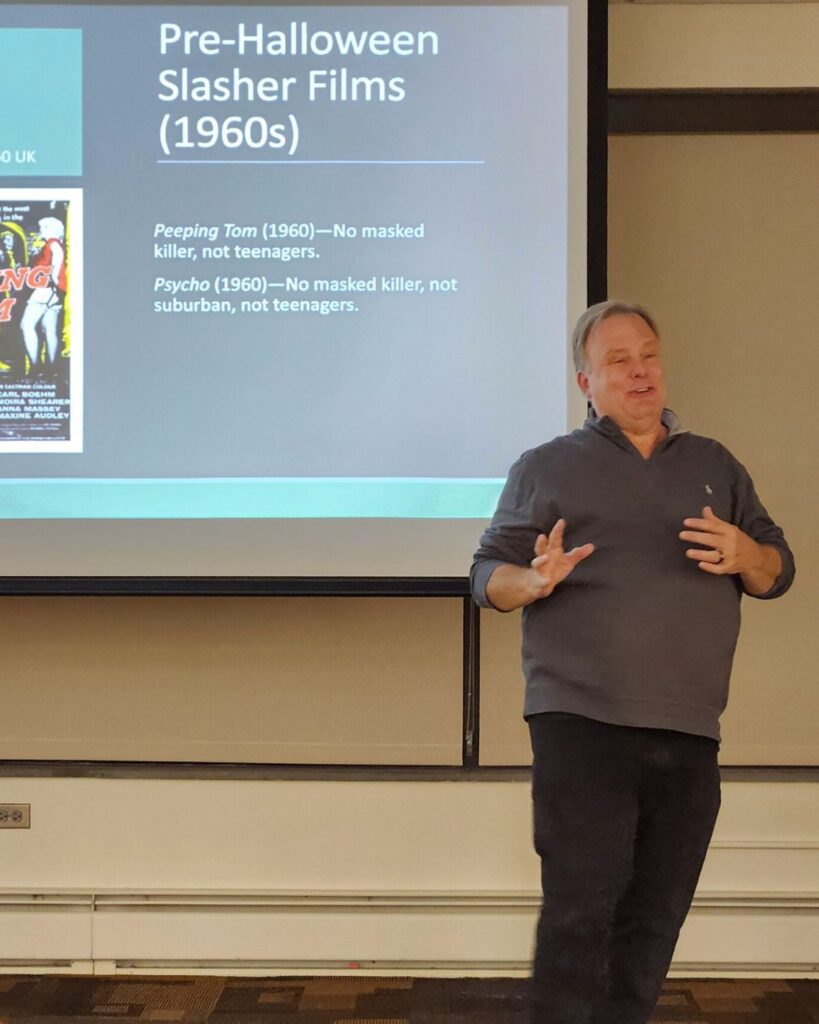This story is part of a UToledo Faculty/Staff Spotlight series, where we feature uplifting stories of the remarkable achievements and contributions of hidden champions who call the University of Toledo home, fostering connections across campus. Cover image by Caroline McGuire for Juice House.
Dr. Daniel Compora has always loved a good story. But, his favorite stories are those of a particular genre.
“Horror, fantasy, science fiction, I like all three. But, I’d have to say horror is my favorite,” he said.
As a professor in the department of English Language and Literature at the University of Toledo, much of Compora’s research is focused on these types of stories that have been of interest to him his entire life.
“I’ve been a folklorist since graduate school. I studied folklore under Tom Barton here, and when he retired, I kind of took over the folklore program,” Compora said.
Compora has published work across various topics related to folklore and popular culture including on teenage slasher films, the Rocky movies, Superman, works by Stephen King and other dystopian fiction.
“I study a lot of modern myths…So that’s kind of a theme in my work,” he said.
Because of his area of expertise, for the past number of years Compora has been asked to speak at the “Carlson Conversations Lecture Series” that is held in the Carlson Library on campus every year, with his lectures always fittingly occuring during the Halloween season. This year’s lecture took place on Oct. 24, 2024 and was titled “Suburban Nightmares: Teenage Terror and the Slasher Film.” His lectures draw a diverse audience of students, university faculty and staff, as well as members of the community.

“Last year we had near 50 [attendees],” Compora said.
Although on the surface Compora’s work focuses on more frightening topics, through literary analysis, he highlights insightful parallels these stories hold to the human condition.
“People look for something to believe in. And, people always look for that universal shared experience, and that’s really all that myths and legends are…there’s a way to share cultural experience,” Compora said.
For example, Compora expounded upon the theme of “toxic nostalgia” that appears in Stephen King’s book, “It.”
“The fact that people’s paths seem to haunt their futures, and that’s really ultimately what ‘It’ is about, that the trauma from our childhood affects us as adults,” he said.
For Compora, that universal shared experience underpinning folklore is not just a theme in books and cult classic films — it is a value he also passes on in his life as a way of giving back to students, just as his professors did for him.
“When I was a freshman just thinking of becoming an English teacher, my old professor, Grant Strickland, gave me two books. And I was so stunned that a person cared enough about me to give [me] books. And for that reason, I’ve always treasured books….Every semester I make sure I give books to students, because I want them to have that same feeling that there is somebody out there that’s willing to share their stuff with them…if I talk to a student and they say, ‘Hey, you mentioned this book in class,’ if I have an extra copy, I give it to them,” Compora said.
Through these interactions, Compora continues not just the legends but a legacy to a new generation, extending the power and influence of more than a good story. Those stories and memories that shaped Compora’s own journey, have now become a commitment to guide and inspire his own students and the community through the power of teaching and storytelling that has greatly influenced him.


